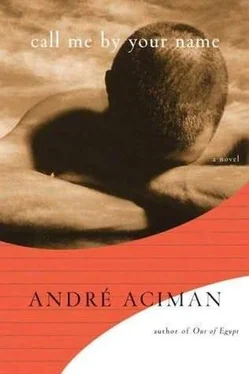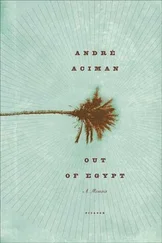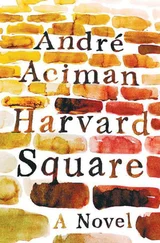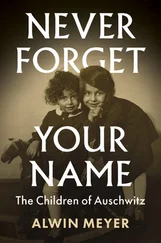André Aciman - Call Me by Your Name
Здесь есть возможность читать онлайн «André Aciman - Call Me by Your Name» весь текст электронной книги совершенно бесплатно (целиком полную версию без сокращений). В некоторых случаях можно слушать аудио, скачать через торрент в формате fb2 и присутствует краткое содержание. Год выпуска: 2007, Издательство: Farrar, Straus and Giroux, Жанр: Современная проза, на английском языке. Описание произведения, (предисловие) а так же отзывы посетителей доступны на портале библиотеки ЛибКат.
- Название:Call Me by Your Name
- Автор:
- Издательство:Farrar, Straus and Giroux
- Жанр:
- Год:2007
- ISBN:нет данных
- Рейтинг книги:5 / 5. Голосов: 6
-
Избранное:Добавить в избранное
- Отзывы:
-
Ваша оценка:
- 100
- 1
- 2
- 3
- 4
- 5
Call Me by Your Name: краткое содержание, описание и аннотация
Предлагаем к чтению аннотацию, описание, краткое содержание или предисловие (зависит от того, что написал сам автор книги «Call Me by Your Name»). Если вы не нашли необходимую информацию о книге — напишите в комментариях, мы постараемся отыскать её.
is clear-eyed, bare-knuckled, and ultimately unforgettable.
Call Me by Your Name — читать онлайн бесплатно полную книгу (весь текст) целиком
Ниже представлен текст книги, разбитый по страницам. Система сохранения места последней прочитанной страницы, позволяет с удобством читать онлайн бесплатно книгу «Call Me by Your Name», без необходимости каждый раз заново искать на чём Вы остановились. Поставьте закладку, и сможете в любой момент перейти на страницу, на которой закончили чтение.
Интервал:
Закладка:
Four years later, while passing through his college town, I did the unusual. I decided to show up. I sat in his afternoon lecture hall and, after class, as he was putting away his books and packing loose sheets into a folder, I walked up to him. I wasn’t going to make him guess who I was, but I wasn’t going to make it easy either.
There was a student who wanted to ask him a question. So I waited my turn. The student eventually left. “You probably don’t remember me,” I began, as he squinted somewhat, trying to place me. He was suddenly distant, as if stricken by the fear that we had met in a place he didn’t care to remember. He put on a tentative, ironic, questioning look, an uncomfortable, puckered smile, as if rehearsing something like, I’m afraid you’re mistaking me for somebody else . Then he paused. “Good God — Elio!” It was my beard that had thrown him off, he said. He embraced me, and then patted my furry face several times as if I were younger than I’d even been that summer so long ago. He hugged me the way he couldn’t bring himself to do on the night when he stepped into my room to tell me he was getting married. “How many years has it been?”
“Fifteen. I counted them last night on my way here.” Then I added: “Actually, that’s not true. I’ve always known.”
“Fifteen it is. Just look at you!
“Look,” he added, “come for a drink, come for dinner, tonight, now, meet my wife, my boys. Please, please, please.”
“I’d love to—”
“I have to drop something in my office, and off we go. It’s a lovely walk along to the parking lot.”
“You don’t understand. I’d love to. But I can’t.”
The “can’t” did not mean I wasn’t free to visit him but that I couldn’t bring myself to do it.
He looked at me as he was still putting away his papers in the leather bag.
“You never did forgive me, did you?”
“Forgive? There was nothing to forgive. If anything, I’m grateful for everything. I remember good things only.”
I had heard people say this in the movies. They seemed to believe it.
“Then what is it?” he asked.
We were leaving his classroom and stepped into the commons where one of those long, languorous autumnal sunsets on the East Coast threw luminous shades of orange over the adjoining hills.
How was I ever going to explain to him, or to myself, why I couldn’t go to his home and meet his family, though every part of me was dying to? Oliver wife. Oliver sons. Oliver pets. Oliver study, desk, books, world, life. What had I expected? A hug, a handshake, a perfunctory hail-fellow-well-met, and then the unavoidable Later! ?
The very possibility of meeting his family suddenly alarmed me — too real, too sudden, too in-my-face, not rehearsed enough. Over the years I’d lodged him in the permanent past, my pluperfect lover, put him on ice, stuffed him with memories and mothballs like a hunted ornament confabulating with the ghost of all my evenings. I’d dust him off from time to time and then put him back on the mantelpiece. He no longer belonged to earth or to life. All I was likely to discover at this point wasn’t just how distant were the paths we’d taken, it was the measure of loss that was going to strike me — a loss I didn’t mind thinking about in abstract terms but which would hurt when stared at in the face, the way nostalgia hurts long after we’ve stopped thinking of things we’ve lost and may never have cared for.
Or was it that I was jealous of his family, of the life he’d made for himself, of the things I never shared and couldn’t possibly have known about? Things he had longed for, loved, and lost, and whose loss had crushed him, but whose presence in his life, when he had them, I wasn’t there to witness and wouldn’t know the first thing about. I wasn’t there when he’d acquired them, wasn’t there when he’d given them up. Or was it much, much simpler? I had come to see if I felt something, if something was still alive. The trouble was I didn’t want anything to be alive either.
All these years, whenever I thought of him, I’d think either of B. or of our last days in Rome, the whole thing leading up to two scenes: the balcony with its attendant agonies and via Santa Maria dell’Anima, where he’d pushed me against the old wall and kissed me and in the end let me put one leg around his. Every time I go back to Rome, I go back to that one spot. It is still alive for me, still resounds with something totally present, as though a heart stolen from a tale by Poe still throbbed under the ancient slate pavement to remind me that, here, I had finally encountered the life that was right for me but had failed to have. I could never think of him in New England. When I lived in New England for a while and was separated from him by no more than fifty miles, I continued to imagine him as stuck in Italy somewhere, unreal and spectral. The places where he’d lived also felt inanimate, and as soon as I tried thinking of them, they too would float and drift away, no less unreal and spectral. Now, it turned out, not only were New England towns very much alive, but so was he. I could easily have thrust myself on him years ago, married or unmarried — unless it was I who, despite all appearances, had all along been unreal and spectral myself.
Or had I come with a far more menial purpose? To find him living alone, waiting for me, craving to be taken back to B.? Yes, both our lives on the same artificial respirator, waiting for that time when we’d finally meet and scale our way back to the Piave memorial.
And then it came out of me: “The truth is I’m not sure I can feel nothing. And if I am to meet your family, I would prefer not to feel anything.” Followed by a dramatic silence. “Perhaps it never went away.”
Was I speaking the truth? Or was the moment, tense and delicate as it was, making me say things I’d never quite admitted to myself and could still not wager were entirely true? “I don’t think it went away,” I repeated.
“So,” he said. His so was the only word that could sum up my uncertainties. But perhaps he had also meant So? as though to question what could possibly have been so shocking about still wanting him after so many years.
“So,” I repeated, as though referring to the capricious aches and sorrows of a fussy third party who happened to be me.
“So, that’s why you can’t come over for drinks?”
“So, that’s why I can’t come over for drinks.”
“What a goose!”
I had altogether forgotten his word.
We reached his office. He introduced me to two or three colleagues who happened to be in the department, surprising me with his total familiarity with every aspect of my career. He knew everything, had kept abreast of the most insignificant details. In some cases, he must have dug out information about me that could only be obtained by surfing the Web. It moved me. I’d assumed he’d totally forgotten me.
“I want to show you something,” he said. His office had a large leather sofa. Oliver sofa, I thought. So this is where he sits and reads. Papers were strewn about the sofa and on the floor, except for the corner seat, which was under an alabaster lamp. Oliver lamp. I remembered sheets lining the floor in his room in B. “Recognize it?” he asked. On the wall was a framed colored reproduction of a poorly preserved fresco of a bearded Mithraic figure. Each of us had bought one on the morning of our visit to San Clemente. I hadn’t seen mine in ages. Next to it on the wall was a framed postcard of Monet’s berm. I recognized it immediately.
“It used to be mine, but you’ve owned it far, far longer than I have.” We belonged to each other, but had lived so far apart that we belonged to others now. Squatters, and only squatters, were the true claimants to our lives.
Читать дальшеИнтервал:
Закладка:
Похожие книги на «Call Me by Your Name»
Представляем Вашему вниманию похожие книги на «Call Me by Your Name» списком для выбора. Мы отобрали схожую по названию и смыслу литературу в надежде предоставить читателям больше вариантов отыскать новые, интересные, ещё непрочитанные произведения.
Обсуждение, отзывы о книге «Call Me by Your Name» и просто собственные мнения читателей. Оставьте ваши комментарии, напишите, что Вы думаете о произведении, его смысле или главных героях. Укажите что конкретно понравилось, а что нет, и почему Вы так считаете.









